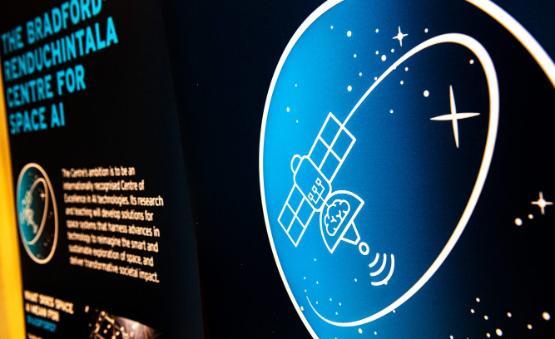World space experts heading to Bradford

Space and satellite experts from around the world converged on Bradford for their annual conference on October 23.
Representatives from NASA, the European Space Agency, Japan Aerospace Exploration Agency, Space Hub Yorkshire, Airbus, the UK Space Agency, Satellite Applications Catapult and many others gathered at the University of Bradford.
The 40th International Communications Satellite Systems Conference’s colloquium will take place at the University’s Norcroft Centre, and is part of a longer three-day event, incorporating the 28th Ka and Broadband Communications Conference. It is the first time the conference has been held in England.
Delegates will discuss topics ranging from NASA’s planned Artemis mission to the Moon and Mars, direct to satellite cellular mobile services, 6G, and the application of artificial intelligence.
Professor Ifiok Otung, Director of the centre, said: “This conference is bringing together some of the world’s leading experts in space exploration and satellite technology. We are proud to be hosting the colloquium at the University of Bradford.
“Our goal is to be a globally recognised centre of excellence in the field of satellite technology. The fact we are hosting this conference means our ambitions are already being realised.
“The development of technology in space is only going to accelerate. We are training graduates for those careers and working with industry leaders, such as Airbus, to ensure they have job-ready skills.”

The event will also be attended by alumnus Dr Murthy Renduchintala, pictured above, who last year made a multi-million pound donation to found the Bradford-Renduchintala Centre for Space AI. The centre, which specialises in satellite technology, is planning to launch its own miniature satellite into low earth orbit in 2024.
The colloquium is sponsored by West Yorkshire Combined authority, Space Hub Yorkshire, Bradford Council, and Satellite Applications Catapult.

Tracy Brabin, Mayor of West Yorkshire, said: “I’m thrilled to welcome the world’s leading space agencies and companies to Bradford, as our thriving space sector continues to drive economic growth and create skilled, well-paid jobs. Technologies engineered in our region are putting satellites and spacecraft into the sky, keeping us all connected and tracking our impact on the Earth in the fight against climate change. I’m confident that the pioneering work of Space Hub Yorkshire and our world-beating universities and businesses will see our regional economy blast off into the future.”
-02-555x416.jpg)
Mandy Ridyard, co-founder of Space Hub Yorkshire, who was awarded an honorary doctorate in engineering by the University of Bradford in 2022, said: "This is a great opportunity to showcase our world-leading cluster of firms, academics and others who are involved in space technology. Space Hub Yorkshire was founded to promote, support and coordinate space activity across the region, and we're really delighted to be involved and that the event is being held in Bradford."
.jpg)
Councillor Susan Hinchcliffe, Leader of Bradford Council, said: “It is a great honour that the University of Bradford is hosting the 40th International Communications Satellite Systems Conference’s colloquium and the first ever in England. It is exciting to have so many big names in the space and satellite domain together in one place. We welcome them to Bradford and hope the conference is a success for the University and the Bradford district.”

Paul Febvre, Chief Technology Officer at Satellite Applications Catapult and Visiting Professor at the Bradford-Renduchintala Centre for Space AI, said: “This is one of the longest running conferences for the space sector. It has influenced critical thinking and stimulated research that has been transformative on a global scale. It’s not often it comes to the UK, so to have it here, in Bradford, recognises the fact there are significant industries and research activities taking place in the region, and it’s appropriate for the colloquium to be held in the industrial heartland of England. The space economy and the potential future lunar economy have huge implications for people. There will be advances in robotics, medicines, communications technology, and these will benefit people in many ways.”
SatNEx course
In addition to the Colloquium, the University will also be hosting the SatNEx course, run in conjunction with the European Space Agency, the goal of which is to educate the next generation of space and satellite engineers.
The course will focus on the use of AI in satellite systems and brings together highly qualified speakers from industry, research, and academic institutions to discuss emerging applications, computing technologies, and dynamic design/processing techniques relevant to AI in various aspects of satellite systems operation.
Select this link to register for the course.

